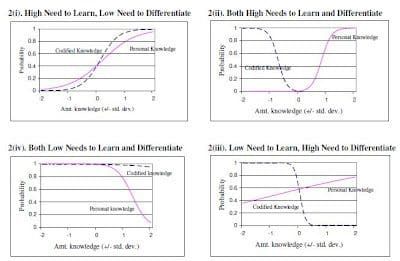Favorite KM requires a learning culture, and motivation to learn comes from motivation to improve. That’s why KM thrives in a high-performance culture, where people are not content with existing performance, and actively seek new knowledge that will help them perform even better. Image from eglin.af.milU.S. Air Force photo/Samuel King Jr
Read More
 Shared by Nick Milton November 8, 2019
Shared by Nick Milton November 8, 2019
Favorite In Knoco, we very often have clients contact us and ask something like “do you have any examples of successful Knowledge Management in the Canadian farm machinery manufacturing business? The answer to such a detailed question is almost always No. Although we have 20 years experience in working Knowledge
Read More
 Shared by Nick Milton November 7, 2019
Shared by Nick Milton November 7, 2019
Favorite Accenture has a rich history of helping customers all over the world build artificial intelligence (AI) and machine learning (ML) powered solutions with AWS services. In doing so, they always look for new and engaging ways to develop their teams with the appropriate level of enablement and hands-on training.
Read More
 Shared by AWS Machine Learning November 6, 2019
Shared by AWS Machine Learning November 6, 2019
Favorite Accenture has a rich history of helping customers all over the world build artificial intelligence (AI) and machine learning (ML) powered solutions with AWS services. In doing so, they always look for new and engaging ways to develop their teams with the appropriate level of enablement and hands-on training.
Read More
 Shared by AWS Machine Learning November 6, 2019
Shared by AWS Machine Learning November 6, 2019
Favorite When it comes to running distributed machine learning (ML) workloads, AWS offers you both managed and self-service offerings. Amazon SageMaker is a managed service that can help engineering, data science, and research teams save time and reduce operational overhead. AWS ParallelCluster is an open-source, self-service cluster management tool for
Read More
 Shared by AWS Machine Learning November 6, 2019
Shared by AWS Machine Learning November 6, 2019
Favorite When it comes to running distributed machine learning (ML) workloads, AWS offers you both managed and self-service offerings. Amazon SageMaker is a managed service that can help engineering, data science, and research teams save time and reduce operational overhead. AWS ParallelCluster is an open-source, self-service cluster management tool for
Read More
 Shared by AWS Machine Learning November 6, 2019
Shared by AWS Machine Learning November 6, 2019
Favorite There are some circumstances where re-using captured knowledge is helpful, but many more where a conversation with an experienced person is a better option. I have referred a few times in this blog to a very interesting paper by Martine Haas and Morten Hansen, who look at success data from bid
Read More
 Shared by Nick Milton November 6, 2019
Shared by Nick Milton November 6, 2019
Favorite A popular post from the archives – the 4 legs on the KM table Image from wikimedia commons It’s very easy to develop an unbalanced perspective on Knowledge Management, especially when we work closely with the topic, but it is something that we should strive to avoid. I was
Read More
 Shared by Nick Milton November 5, 2019
Shared by Nick Milton November 5, 2019
Favorite Academic research and open-source software development are at the forefront of machine learning (ML) technology development. Since 2017, the AWS Machine Learning Research Awards (MLRA) has been aiming to advance machine learning by funding innovative research, training students, and providing researchers with access to the latest technology. MLRA has
Read More
 Shared by AWS Machine Learning November 1, 2019
Shared by AWS Machine Learning November 1, 2019
Favorite Financial institutions that extend credit face the dual tasks of evaluating the credit risk associated with each loan application and determining a threshold that defines the level of risk they are willing to take on. The evaluation of credit risk is a common application of machine learning (ML) classification
Read More
 Shared by AWS Machine Learning October 31, 2019
Shared by AWS Machine Learning October 31, 2019
![]() Shared by Nick Milton November 8, 2019
Shared by Nick Milton November 8, 2019







